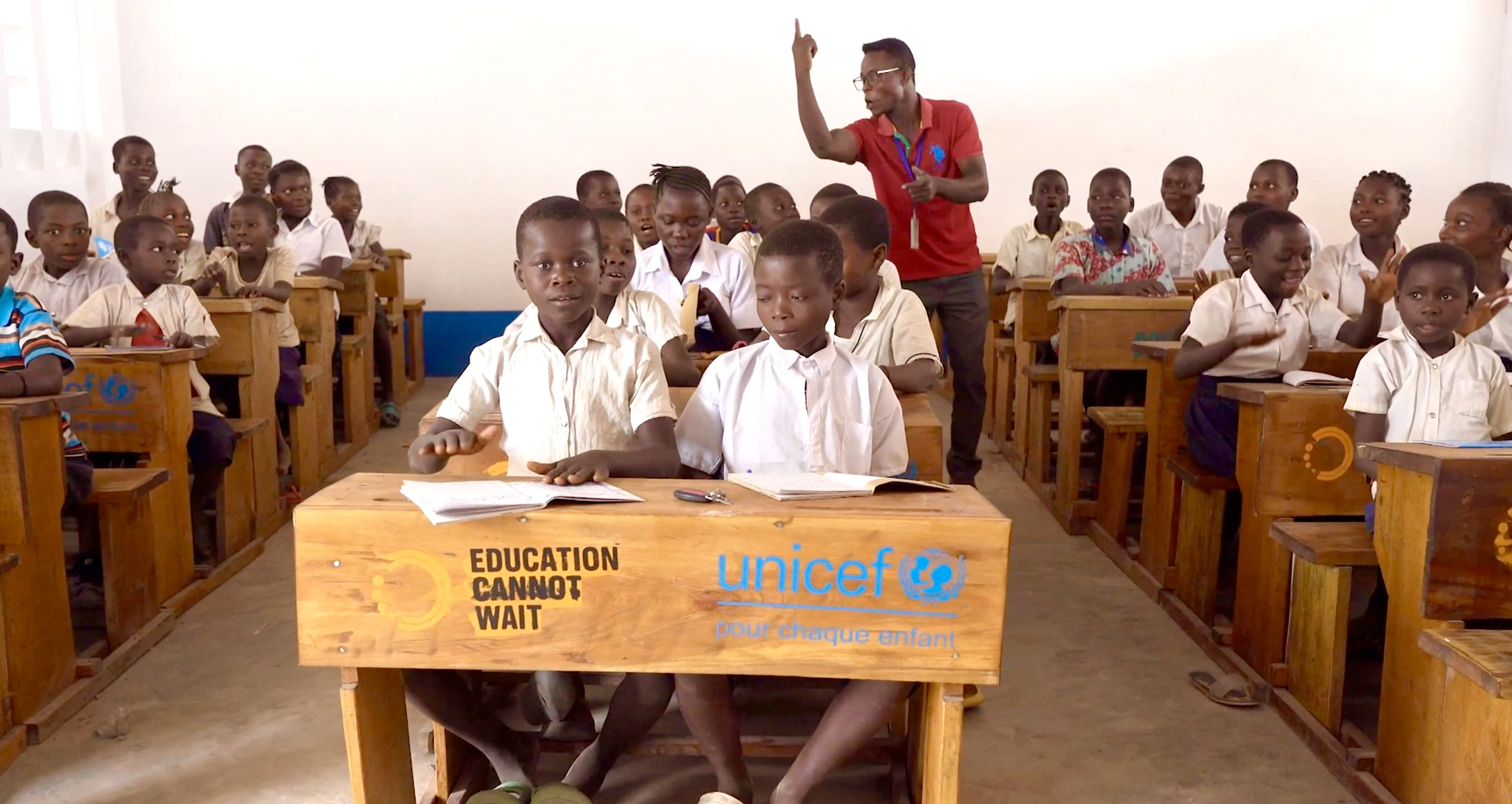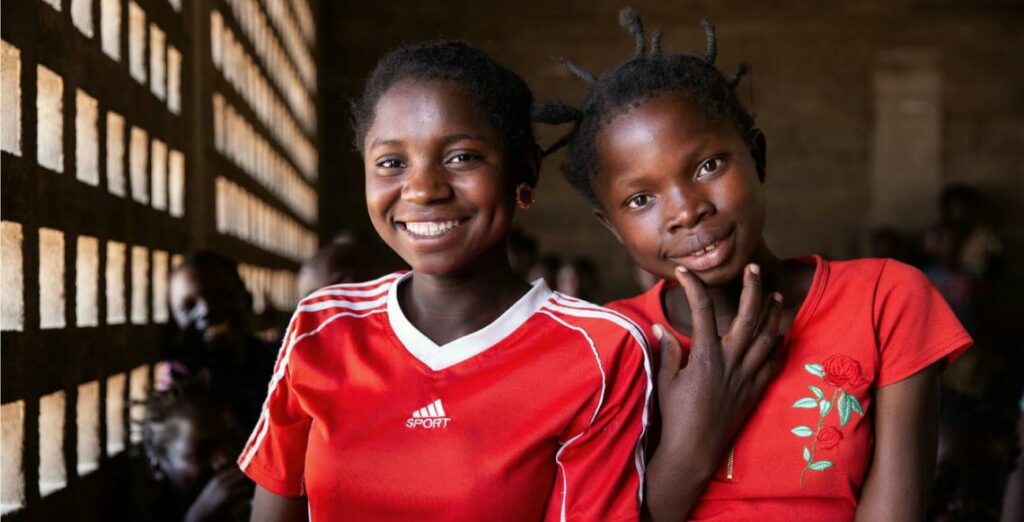Education Cannot Wait Approves US$22.2 Million for Multi-year Resilience Programme in the Democratic Republic of the Congo

In response to large-scale, complex and protracted crises, the three year programme aims to reach over 200,000 internally displaced, returnee and refugee girls and boys – as well as host community children and youth – with safe and equitable quality education.
Responding to the intensifying humanitarian crisis in the Democratic Republic of Congo, Education Cannot Wait (ECW) today announced US$22.2 million in catalytic investment grants to accelerate the nation’s education in emergency response. The initial programme will run for three years, with the goal of leveraging an additional US$45.3 million in co-financing from national and global partners, the private sector and philanthropic foundations to reach over 200,000 children and youth.
“Education is a top priority for the government of the Democratic Republic of the Congo, contributing to sustainable development and peace in the country,” said Jean-Marie Mangobe Bomungo, Secretary-General of the Ministry of Primary, Secondary and Technical Education. “Refugee, internally displaced and host community children must be able to benefit from education like all children. Thanks to Education Cannot Wait funding, this new multi-year resilience programme will help us to achieve the Sustainable Development Goals and leave no one behind, especially as we work to guarantee inclusive, quality education for every girl and boy in the country.”
“Millions of children and youth in the Democratic Republic of the Congo are being left behind. Facing the compounding risks of violence, conflict, food insecurity, natural disasters – as well as the COVID-19 pandemic and multiple health crises over the years including cholera and ebola – girls and boys are at high risk of dropping out of school permanently, being forcefully recruited into armed and militant groups, or being pushed out of school to join the workforce. For girls, the situation is even worse. They risk all forms of gender-based violence, including sexual exploitation, forced child marriage and early pregnancy and various forms of abuse,” said Yasmine Sherif, Director of Education Cannot Wait. “Working together with the speed of humanitarians and the quality of development in crisis contexts, this new joint programme helps bridge the humanitarian-development-peace nexus and aims to address the current needs, while also building long-term solutions to keep Democratic Republic of the Congo’s most crisis-affected children and youth in school with a real opportunity for learning. Their education cannot wait. Now is the time for hope.”
The COVID-19 pandemic continues to have a severe impact on education in the Democratic Republic of the Congo. Following the closure of schools as a preventive measure, around 27 million students have had their schooling interrupted. This is in addition to an estimated 15 to 23 million school-aged children and adolescents who were out of school before the COVID-19 crisis. The government is stepping up its response, with recent initiatives to support free primary education allowing more children the opportunity to attend school, but this has also caused overcrowded classrooms and is depleting resources.
Attacks on schools and recruitment into armed groups are on the rise. Recruitment into armed groups doubled from the previous year in 2017, with over 1,000 verified cases. Schools are being destroyed during armed conflicts and are being occupied by armed groups or displaced persons. In crisis-affected Tanganyika, Ituri and Kasai Central provinces, one out of every four children and youth are out of school. Across the country, teachers are hard to retain and receive low pay, and only 5 per cent of children have access to pre-school education, with girls receiving more access than boys.
This new, multi-year education programme – implemented by UNICEF in coordination with the Government of the Democratic Republic of Congo, national and international partners, and a broad coalition of partners on the ground – the programme will improve equitable access to inclusive learning environments in the provinces of Tanganyika, Ituri and Kasaï Central.
Fully funded, the programme will reach over 200,000 internally displaced, returnee and deported refugee girls and boys – as well as host community children and youth. Out of this total, Education Cannot Wait seed funding will focus on Tanganyika province to reach 68,000 children and adolescents aged 5–17 years, 52 per cent of whom are girls. These include children from internally displaced, returnee and refugee populations and children with disabilities (15 per cent of the total). Teachers and school communities, indigenous people, former child soldiers, victims of gender-based violence, unaccompanied children, children from host communities, and other vulnerable children and adolescents are also targeted through the intervention.
Notes to editors:
Programme outputs:
- The programme focuses on increasing access to safe and quality education for all children and adolescents with a focus on the most vulnerable, including those with disabilities. This will be partially accomplished through the construction or rehabilitation, and equipping of learning spaces for formal (pre-primary, primary and secondary) and non-formal education (remedial education and vocational training centres). The school environment will be adapted to ensure equity of access and to meet local safety, hygiene and sanitation standards.
- To address high numbers of out-of-school children, and to prevent further dropouts, particularly during and after the COVID-19 pandemic, the programme will address the underlying issues that lead to drop-out. Collaboration between the Education Cluster and the government together with the Health, Nutrition and Child Protection Cluster will develop a multi-sectoral approach to nutrition and wellbeing. To address issues of food security, learners will be provided school meals and will also be taught to grow gardens and to learn about nutrition and ecology.
- The programme will ensure that children and adolescents have access to a holistic package of education that is relevant to their academic, physical and socio-emotional development.
- The programme will work with the local, provincial and national government to improve key capacities for the provision of quality and relevant learning. It will also ensure the systems are in place that monitor the quality of learning, respond to crisis and improve equity of access to education.
- The programme will address the significant protection risks faced by children in the Democratic Republic of Congo, and in particular for children affected by armed conflict. This starts with creating a safe and protective learning environment. A safe school approach will be developed and adapted in accordance with the joint education needs assessments results and through joint planning with the Child Protection Cluster.
- The programme will address gender equity and inclusion through direct action and by creating a supportive environment that establishes space for greater inclusiveness in the Democratic Republic of Congo in the long term. In line with the programmatic approach, the programme will address immediate barriers to learning, particularly for girls, while also strengthening systems to ensure that these barriers are reduced indefinitely.
For Press Inquiries:
Anouk Desgroseilliers:
adesgroseilliers@un-ecw.org
+1-917-640-6820
Kent Page:
kpage@unicef.org
+1-917-302-1735



